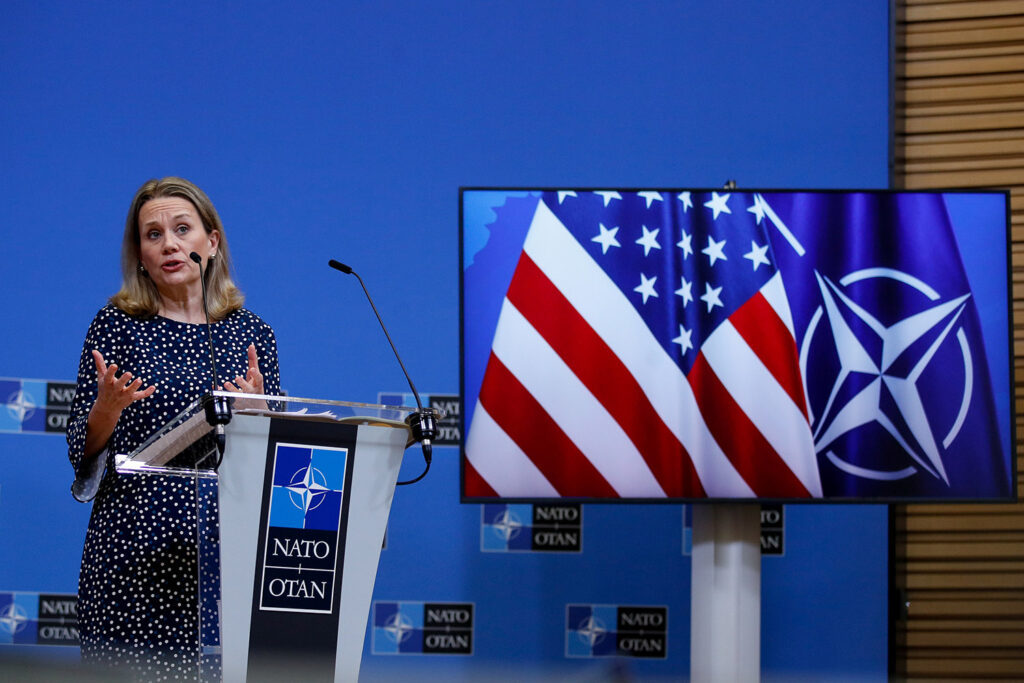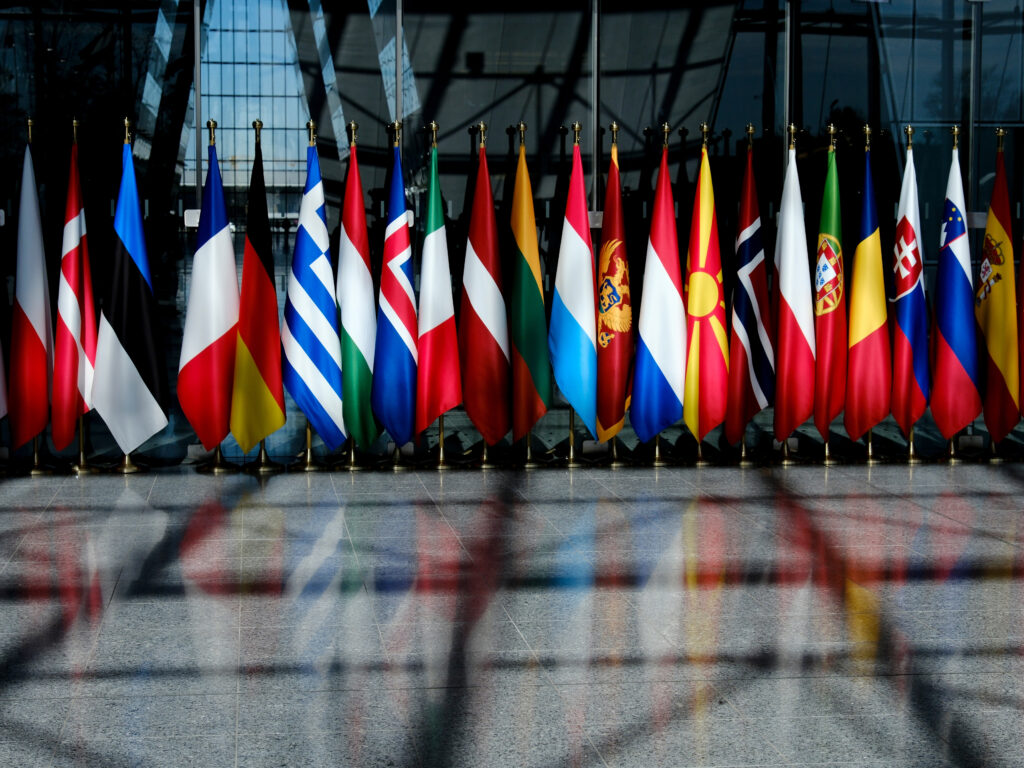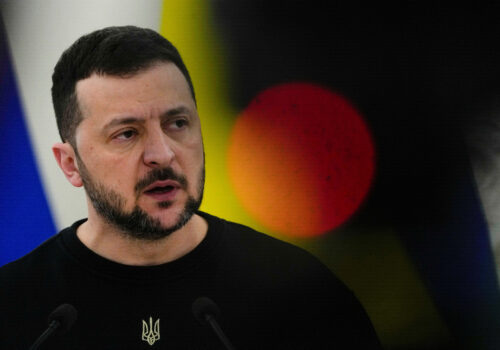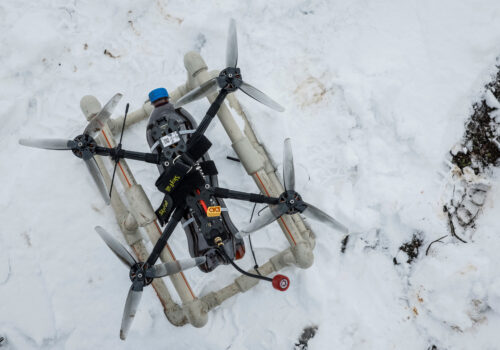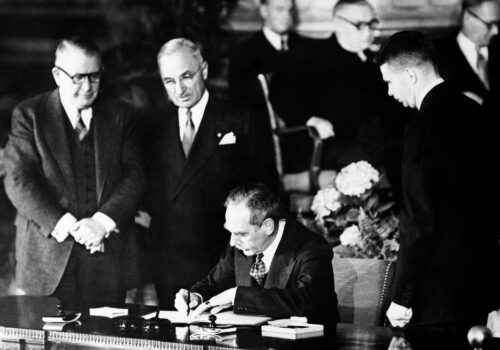Watch the event
When it comes to Ukraine’s NATO membership, the Alliance was “not prepared last summer to extend a proper invitation . . . and I am not expecting the Alliance to do that this summer,” said US permanent representative to NATO Julianne Smith.
“What I am expecting allies to do” at the 2024 NATO Summit in Washington this July, she said, “is to construct a bridge to membership by offering Ukraine a deliverable that will enable them to become even closer to this Alliance.”
Smith spoke at an Atlantic Council curtain-raiser event on Monday (held in partnership with the Lithuanian Ministry of National Defense) ahead of the NATO Summit. While she said she couldn’t offer details on what that “deliverable” for Ukraine would look like, she said to expect a measure to “institutionalize” the bilateral support to Ukraine that has expanded over the past two years.
In the meantime, she said, NATO has been continuing to support Ukraine, including by convening its NATO-Ukraine Council (created at the 2023 NATO Summit) and by inviting Ukrainian President Volodymyr Zelenskyy to the Washington summit to “lock arms with him,” in a way that shows Russia that “NATO allies aren’t going anywhere.”
“We’re not looking away; we’re not growing impatient,” Smith said. “We will stand with Ukraine for as long as it takes.”
Below are more takeaways from the conversation, moderated by Punchbowl News Senior Congressional Reporter Andrew Desiderio.
A commitment to burden sharing
- Smith said that by the time the Washington summit convenes, at least two-thirds of the countries in the Alliance (just over twenty of them) will be meeting their pledges to spend at least 2 percent of their gross domestic product (GDP) on defense. She pointed out that Germany and Norway have recently debuted plans to meet the pledge this year.
- “The real celebration will come when we get to thirty-two [countries],” she said. “We are marching towards that day.”
- The allies that have not hit the 2-percent mark currently have plans in place to reach it in about “two, three years,” Smith said. “We will push as hard as we can to ensure that all the allies get there.”
- Recently, the United Kingdom argued that NATO should increase its defense spending target to 2.5 percent of GDP; Poland recently called for 3 percent. Smith said that 2 percent “is a floor” and “not a ceiling,” and that as NATO evaluates its new regional defense plans, the Alliance is “slowly reaching the conclusion that 2 percent will not be enough.”
- But the discussions on “burden sharing” at the Washington summit won’t be limited to that 2 percent goal, Smith said. “We are also talking about what we are doing together to support our friends in Ukraine,” she said.
Seventy-five years of resilience and transformation
- The Washington summit will be a “celebration” not only of the Alliance’s adaptability and resilience but also of the “over seven decades of every US president, irrespective of their political affiliations, supporting and leading this Alliance,” Smith said. “And we expect that to continue.”
- Ahead of the summit, Smith explained, she and other officials from NATO countries are “working together to get a message out . . . about the importance of this Alliance” to help Americans and Europeans “understand how NATO is a different organization” today than when it was created.
- “What was once an Alliance that focused primarily on conventional military threats now is an Alliance that copes with and addresses the full spectrum of security challenges as defined by the thirty-two allies,” Smith said. She added that NATO is preparing for “a variety of threats,” from climate change to cyber warfare, and is also looking to improve countries’ resilience and boost women’s involvement in peace and security solutions.
- Over the past few years, NATO has worked more closely with its Indo-Pacific partners; for example, the Alliance invited Japan, South Korea, Australia, and New Zealand to the Vilnius summit last year. “They value the opportunity to exchange best practices and insights” on challenges that “know no geographic limits,” such as the rapid evolution of technology, cyberattacks, and disinformation campaigns stemming from China and Russia, Smith said.
- “The Alliance is increasingly talking about what [China] is doing in and around the Euro-Atlantic area,” she said. “As we look to that challenge, we can no doubt learn from our friends in the Indo-Pacific.”
Katherine Walla is an associate director on the editorial team at the Atlantic Council.
Watch the conversation
Further reading
Tue, Apr 23, 2024
The war in Ukraine could reach a decision point by the NATO Summit. Policymakers need to prepare now.
New Atlanticist By Andrew A. Michta
Russia has launched its third major mobilization wave, which could result in battlefield gains right as NATO meets in Washington on July 9-11.
Fri, Apr 5, 2024
Accelerating transatlantic defense innovation in an era of strategic competition
Issue Brief By John T. Watts
NATO’s warfighting edge will not be sufficient for the transatlantic community to weather today’s military and geopolitical realities.
Thu, Apr 4, 2024
Fighting history’s ‘blind tides’
Inflection Points Today By Frederick Kempe
On the seventy-fifth anniversary of the signing of the North Atlantic Treaty, heed the wise words of President Harry S. Truman. The risks of inaction are greater than those of action.
Image: US Permanent Representative to NATO Julianne Smith speaks during a news briefing on the eve of a meeting of Alliance defense ministers in Brussels, Belgium, on February 15, 2022. Photo via REUTERS/Johanna Geron.
